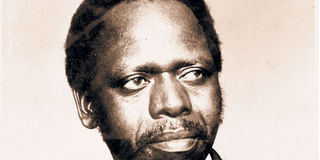Wamalwa was not merely a politician; he was a political leader

Michael Kijana Wamalwa. PHOTO | FILE
What you need to know:
- Michael Kijana Wamalwa was a leader with a national outlook.
His worldview resisted tribal or ethnic caging.
Memories of the late Kijana Wamalwa, 13 years on, are still stubbornly fresh in the minds of many who worked or interacted closely with him.
Perhaps this is so because Wamalwa’s trademark charm, genuineness and wit lent his persona an enduring imprint that easily endeared him to just anyone. He, simply, was remarkable.
A critical pillar in the formation and animation of the National Rainbow Coalition that won the 2002 presidency, Wamalwa was not merely a politician. Rather, he was a political leader. A political leader, in my view, commands respect due to his or her convictions and abiding commitment to a cause or causes.
His politics and leadership were distinguished by unequivocal convictions and causes. He was a leader with a national outlook. His worldview resisted tribal or ethnic caging.
Hardly did his public or private proclamations negate his nationalistic viewpoint. Like Tom Mboya before him, Wamalwa was a tenacious supporter and believer of the prospect of Kenya’s oneness.
MASINDE MULIRO
Yet back home his political standing was only equal to that of the iconic Masinde Muliro, his mentor, whose gravitas as a political leader remains legendary to date. During the quest for political pluralism of the late 1980s and 1990s, Wamalwa was a constant and calm voice of reason even when noisy agitation seemed more attractive to his peers and contemporaries.
His temperate nature and well-reasoned repartees to his political nemeses brought welcome humour to situations of near-hopelessness and endless despair in the run-up to the return of multi-partyism in Kenya. Wamalwa’s political genius manifested best whenever he got a chance to team up with leaders riding on a progressive agenda whichever political divide such leaders were deemed to subscribe to.
In retrospect, he was a political brand above party divide and evidently averse to political personality cults. As a Vice-President, Wamalwa possessed the apparatus and rare competence that bridged occasional gaps between the Legislature and the Judiciary with the Executive.
Wamalwa not only understood the cogs that interconnected the three Arms of Government; he had the essential mastery to oil each of them for a seamless and smooth glide. Doubtlessly, his wisdom and brilliance were assets in creating confidence to a citizenry buoyed by the hope of a whole new political horizon.
Much has been said about Wamalwa’s grasp of English. It is true the man had a way with words but not just for the sake of mesmerising his audiences. His eloquence was not laboured neither was it for vain display. It was a tool he used ably to build consensus, an instrument he applied marvellously to amass political capital not just in favour of self but for the benefit of the teams he worked with.





